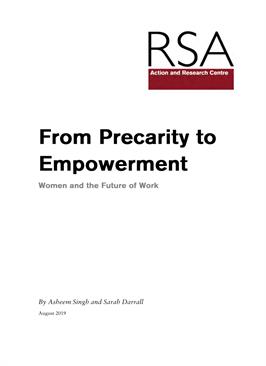This paper aims to raise awareness of the ways in which women are bearing the brunt of economic problems in the UK, and how the labour market, at present, is a precarious environment for many women.
The major challenges posed by radical technologies to the future of work for women, are grounded in low participation in the gig economy, underrepresentation in STEM, discrimination by algorithm in recruitment, and the proliferation of automation. Although these challenges are widespread, and being felt by many across society, our research shows that women are experiencing the resulting precarity most acutely.
Our original polling, in partnership with Populus, revealed that economic security, in both the short- and long-term, was a considerable concern for many women:
- 43 percent of women report that they would struggle to pay an unexpected bill of £100 (compared to 30 percent of men).
- 54 percent of women didn’t feel they would have enough in savings to maintain a decent standard of living in retirement (compared to 37 percent of men).
We conclude by taking a view on the policy and practice reforms that need to be developed to ensure women are included and empowered in the age of technology.
This paper constitutes the RSA’s submission to the Women’s Budget Group’s Commission on a Gender-Equal Economy.
Download 'From precarity to empowerment' report (2.2MB)
pdf 2.3 MB
Contributors


Related reports
-
A blueprint for good work
This report sets out eight ideas to form the basis for a new social contract for good work.
-
Retail therapy: towards a future of good work in retail
This snapshot paper summarises our enquiry into the future of retail. We explore possible future challenges and opportunities for the sector and outline a set of prototype policy and practice interventions, developed in partnership with major retailers, policy makers and wider civil society.
-
Field Guide to the Future of Work: Essay collection
In this essay collection we present a plurality of perspectives on the future of work. Far from being a manifesto for fatalism, this pamphlet should rather be read as a call to action.



